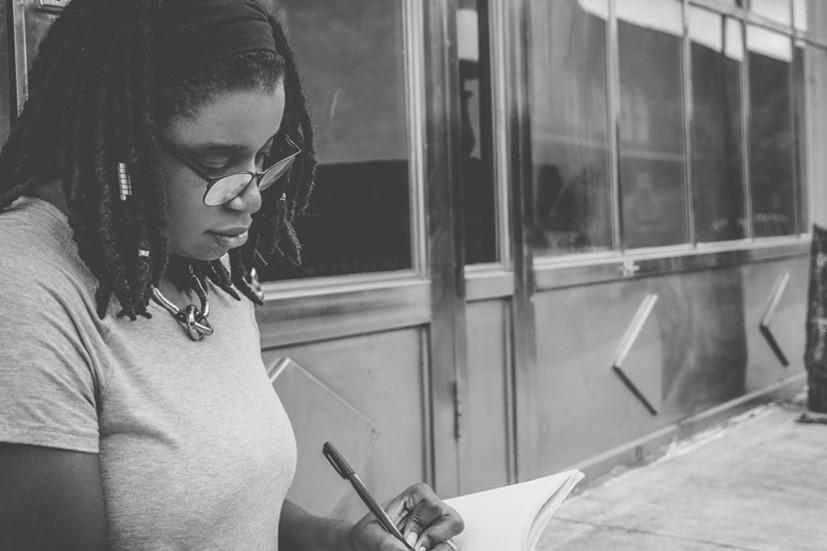Elisabeth Goodman writes:
I've been enjoying a bit of a retreat this week, at home, walking, cycling and swimming; experimenting with plant-based meals using produce from the allotment; reading some fascinating books.
I hope you are having an enjoyable summer, however you are choosing to spend it.
Here is a bit of a random mix of materials, inspired by my reading, for you to dip into:
- Human skills and career prospects
- Forest bathing
- Reconnecting with our values and beliefs
Do get in touch if you would like to arrange some coaching with me.
Elisabeth Goodman
ACC - International Coaching Federation
Human skills and career prospects

Photo by Eye for Ebony on Unsplash
The July - August issue of Harvard Business Review carries an article on "The C-suite skills that matter most".
Technical or financial skills are no longer enough. Companies have woken up to the fact that leaders now need to be "good with people"!
Those of you who have worked with RiverRheeknow that this focus on human, soft, or interpersonal skills is very much what we are about.
So why this relatively recent awakening on the part of the authors of this article (Sadun, R., Fuller, J., Hansen, S. and Neal, P.J.)?
And what do they mean by soft skills?
What are soft skills? The authors cite: the ability ""to motivate diverse, technologically savvy, and global workforces." They also talk about "social skills" that include:
- Self-awareness
- Listening and communicating well
- Being able to work with different types of people
- "Theory of mind" - being able to work out what others are thinking and feeling
(The authors relate the last item to the "Reading the mind in the eyes test". This is a sociological measure of how well people can read people's moods by looking at images of their eyes. As a coach, I would be wary of 'mind reading' and encourage dialogue instead. )
When we work with people on their interpersonal and communication skills we tend to describe them under two headings:
- Self-awareness: understanding who we are when we are at your best, our personal strengths and challenges, and how to manage all of this in a way that feels right to us.
- Social awareness and relationship management: how to flex our style to effectively listen, communicate with and influence others
How well do these definitions reflect your own perspective of soft skills?
Why the interest? Although the focus of the article is on C-suite executives, they do indicate that:
"At all employment levels today, more and more jobs require highly developed social skills"
They go on to list the main reasons for this heightened interest:
The size and complexity of organisations. It's true that the larger and more complex the organisation, the more skill it takes to navigate all of the interactions involved. But these might be considerations for smaller organisations too, and for more junior people working with people from different disciplines than their own.
More sophisticated information-processing technology - requiring more people-related skill for the decisions involved in using the technology and working with the outputs. Companies using similar technology might even differentiate themselves in terms of the quality of their interpersonal skills.
Social media - news gets out fast. What people do or say matters - both in terms of what gets shared in the media, and how leaders interact with it.
The heightened interest in diversity and inclusion. Leaders and organisations who use their social skills to manage this well will create an environment where people will thrive. It will also boost the company's reputation and ability to attract others.
What circumstances are drawing out your use of human skills?
How might they be important for your career progression?
You can read more about on this topic in The C-suite skills that matter most. Harvard Business Review, July - August 2022, pp. 42-50

Forest bathing
I have been spending more time than ever out-of-doors this summer: tending the garden and the allotment, going out for walks and for cycles, the occasional swim in the sea.
It's something that I and maybe you have experienced as a legacy of the pandemic - a sense of reconnecting with nature.
Whether we:
- Go for a full-out hike in the mountains, in forests, or along our village footpaths;
- Swim in the sea or in a lake;
- Take 20 minutes at lunchtime to stroll or sit out of doors;
- Look out of an office window;
- Or have a plant in our room.
We know that being in or with nature is good for us.
Nature is part of us, and we are part of nature. It's also a proven way to lower stress, increase our energy, boost our mood, help with sleep.
Being in nature, really being in it, taking it in through all of our senses, is a form of mindfulness. Being in nature gives us the opportunity to really be present, in the moment. Especially if we are out there on our own or, if with others, in companionable silence.
It's an opportunity to stop, pause, reflect and then turn off the ceaseless chatter in our heads. To reconnect with ourselves and also with the wider universe.
Nature and its beneficial effect is a topic I've reflected on and that features in one of two books that I am writing. The first book is on how self-development impacts the quality of our coaching. Spending more time in nature is one of the things that has done that for me. (This book is called "Coaching in the Helix". It's primarily for coaches and I'm aiming to publish it in 1Q2023.)
I'm also, very slowly, starting to use nature in my coaching with others. We use it as a calming influence. We also use it as an element in our coaching.
Sometimes what we notice about a tree, a bird, a stone, can act as a metaphor for a question that we are pondering.
Taking time in nature can offer us a solution to a problem that was just not available to us in the busy-ness of work and of being indoors.
The second book I'm working on is a collection of poems and prose inspired by my walks in nature. Here is one of the poems:
Being me
Being held by the trees
as I walk between their pale trunks
and glowing greenery
is not just about tuning into Nature.
It’s also about tuning into Me.
There’s the physicality
of my feet treading the hardened paths,
the breeze blowing warm and cool on my arms,
the silence between the cars.
And there’s that core at the centre of me;
the will,
and the joy,
of being me.
(From "Wellbeing Musings", RiverRhee Publishing, also due out 1Q 2023)
The Japanese have a term for forest bathing: shinrin-yoku. There are words for it in other languages too: friluftsliv in Swedish, waldeinsamkeit in German.
You can read more about forest bathing, and the benefits of being in nature in How to forest bathe and why on the Fierce Kindness website, 13th August 2020.
Reconnecting with our values and beliefs

One of my local walks. That wide open space always feels like the start of an adventure!
One of the books that I'm reading at the moment is Misty Copeland's autobiography "Life in motion. An unlikely ballerina." I was prompted to read it by her "Life's Work" interview in the July-August issue of Harvard Business Review.
Reading the interview, and the book, reminded me of the pivotal effect that our values and beliefs can have on our choices in life, and also on how happy we are with our lives.
And yet often, we are not fully conscious of what our values and beliefs are. They tend to be shaped by the experiences that we have had as children, teenagers, young adults. As Charles Tart points out in another book I'm ready ("Living the mindful life"), those values and beliefs may or may not be relevant now. They could have served us well as children, they may be a straight jacket now!
Misty Copeland became the first Black female principal dancer of the American Ballet Theatre inn 2015. She believes that the discipline, rigour and sacrifice that she experienced are “beautiful” things that all children should experience as part of their development. Ballet also gave her the structure and control that she missed in her childhood, as well as the opportunity to be part of something bigger than herself.
The closing words of the HBR interview:
There’s no way to go on stage and be the dancer and the artist you want to be if you’re not prepared, focused, and grounded.
How do Misty Copeland's values and beliefs relate to yours? Do you know what yours are? Are there any that no longer serve you well? What feels important to you in life now?
We are keen to tailor RiverRhee’s one-to-one and group coaching in a way that will help you, your managers and your teams be at their best.
See the RiverRhee Consulting website for more details
